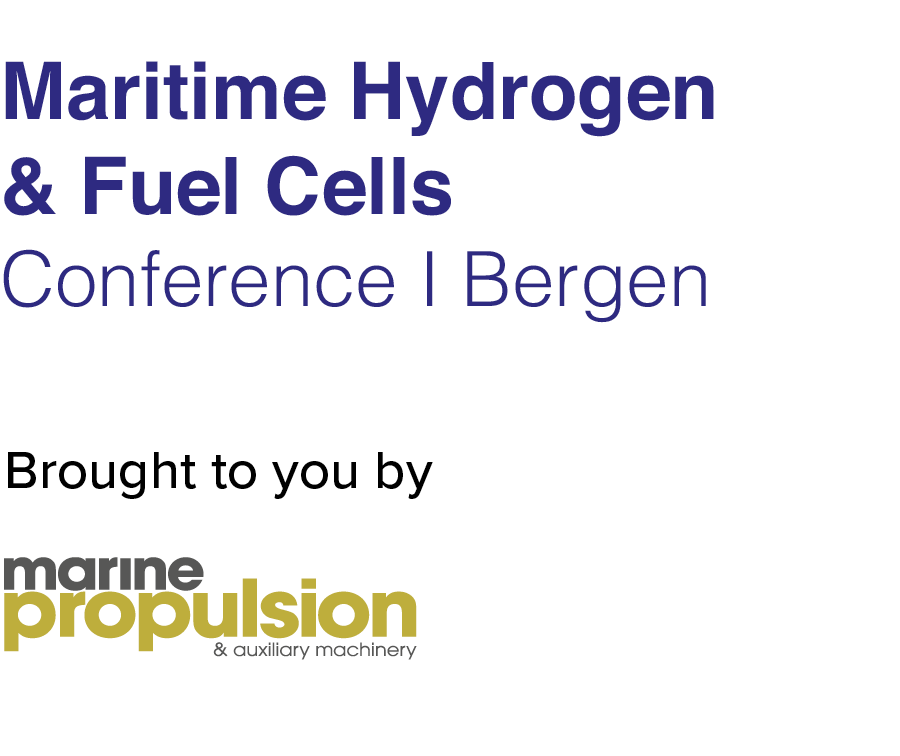Maritime Hydrogen & Fuel Cells Conference Bergen, 2019

How hydrogen fuel cells will revolutionise maritime
Hydrogen and fuel cell technologies are being embraced by the maritime industry as part of wider efforts to promote a green operational footprint. Hydrogen fuel cell vessels and traditional electric vessels with lithium batteries are currently being developed for various maritime applications. This one-day conference will focus on the key features and benefits of hydrogen fuel cell vessels.
Industry leaders will bring to light the latest industry initiatives on hydrogen and fuel cells. Speakers will discuss how hydrogen fuel cells and traditional batteries can coexist and complement each other in delivering clean and efficient energy solutions for various maritime applications.
This conference will take place the day before the Maritime Hybrid & Electric Conference which takes place in the same venue in Bergen on 4-5 September. Special rates are available for those wishing to attend all 3 days.
Who you will meet
Attendees will include: hydrogen fuel cell manufacturers; engine manufacturers; systems integrators; naval architects; vessel owners and operators; industry associations; classifications societies; analysts; and industry suppliers.
Topics to be discussed
• Potential of hydrogen and fuel cells for maritime applications
• Industry update – current R&D initiatives and the latest industry data
• Understanding the features and benefits - How do fuel cells compare against traditional battery technologies
• How can the enhanced energy density of hydrogen benefit maritime vessels?
• Proton Exchange Membrane (PEM) fuel cells for maritime
• Solid Oxide fuel cells for maritime
• Understanding the potential of ammonia as a renewable fuel
• Engineering considerations when dealing with hydrogen and fuel cells – vessel layout and weight
• Can hydrogen and fuel cells be produced in an environmentally friendly and cost-effective way?
• Case studies of recent industry initiatives and vessels
• The business case for hydrogen fuel cell vessels
All Speakers

Jan-Erik Rasanen
Edwin Pang
Olav Roald Hansen
Paul Helland
Hilde-Kristin Sæter
Rohit Prasad
Programme
Programme
08:00 Registration, coffee and networking
09:00 Welcome address from Riviera Maritime Media
Edwin Lampert, Head of Content, Riviera Maritime Media
SESSION ONE: INDUSTRY UPDATE
The opening session will set the scene by providing an industry update. Speakers will look at why hydrogen fuel cells are considered to be a compelling solution for the maritime sector. Speakers will also discuss the leading industry R&D initiatives currently underway.
09:10 Keynote: A ferry operator’s perspective on the potential for hydrogen fuel cells
• What is the current status on energy sources used for ferries and fast ferries?
• Making hydrogen the cheaper alternative
• What practical challenges do we meet when using hydrogen fuel cells?
• What does the future hold for us?
Hilde-Kristin Sæter, Project Manager, Norled
09:30 Q&A
09:40 Fuel Cell technology -a paradigm shift for maritime applications
Our fuel cell studies so far:
• MPV, PSV’s.
• Research vessels.
• Ferries, RORO, Ro-pax.
• Fast ferries.
• Oil rigs/wind farms.
Johan Burgren, Business Manager - Marine Fuel Cell Systems, PowerCell
10:00 Q&A
10:10 Networking coffee break in the exhibition area
SESSION TWO: INNOVATION IN HYDROGEN AND FUEL CELL TECHNOLOGIES
This session will look at how clean hydrogen can be sourced, stored and transported. Fuel cell manufacturers will discuss how their latest solutions benefit vessel owners and operators.
10:50 Design optimization reflecting risk for a hydrogen storage and fuel cell system
• What are the main risks of using a hydrogen fuel cell system?
• How best to store hydrogen in large quantities?
• Can explosion risk inside a fuel cell compartment be prevented?
• How to document acceptable level of safety, what is good enough?
• Issues frequently misunderstood within hydrogen safety
Olav Roald Hansen, Senior Principal Consultant, Risk Management Consulting, Lloyd’s Register
11:10 Q&A
11:20 Fuel cell technologies for maritime applications
• Proton Exchange Membrane (PEM) fuel cells for maritime applications.
• Solid Oxide Fuel Cell systems as an alternative to PEM’s.
• Fuel cell stacks and their application.
• End-of-life of fuel cells, is it possible to dispose in an environmentally friendly way?
Kristina Fløche Juelsgaard, Director of Business Development, Ballard
11:40 Q&A
11:50 Case study: Developing hydrogen fuel cell systems for powering zero-emission cruise vessels
• GE Power Conversion & Nedstack collaboration.
• Market review, regulations ahead, solutions at sea.
• Achieving fuel cell solutions that enable a zero-emission cruise industry.
Renaud Cornu, Passenger Vessels Market Leader, Manager, General Electric
12:10 Q&A
12:20 Networking lunch break in the exhibition area
SESSION THREE: ENGINEERING CONSIDERATIONS
Naval architects and system integrators will address the engineering considerations that need to be made for hydrogen fuel cell powered vessels. Speakers will discuss vessel layout, fuel cell power systems, drive trains and fuel cell system risks.
13:30 Vessel engineering and layout
Vessel engineering considerations when utilising a hydrogen fuel cell system.
• Vessel layout and space management challenges.
• How to manage the weight of hydrogen fuel cell systems.
Jan-Erik Rasanen, Head of New Technologies, Foreship
13:50 Q&A
14:00 Design and engineering of vessels utilising hydrogen as energy carrier
• Presentation of ongoing LMG Marin design that will utilize hydrogen as energy carrier
• Presentation of the design approach for a vessel using hydrogen as energy carrier
• Presentation of engineering challenges for designs utilizing hydrogen as energy carrier
• How do we expect the future market for vessels using hydrogen as energy carrier to be, and what are the expected next steps?
Mikal Hansson Espedal, Project Manager, LMG Marin
14:20 Q&A
SESSION FOUR: INDUSTRY CASE STUDIES
The closing session will bring together a number of case studies that will include world-first hydrogen fuel cell projects. These case studies will shed light on the full potential of hydrogen fuel cells and how they could revolutionise the maritime industry.
14:30 Case study: HySeas III – A ferry for Orkney’s Hydrogen Future
• The Orkney context – what do you do with excess renewable energy?
• Hydrogen infrastructure on land.
• How do ferries fit in?
Edwin Pang, Project Dissemination Lead, HySeas III on behalf of INTERFERRY
14:50 Q&A
15:00 Networking coffee break in the exhibition area
15:40 Case study: The Zemships Project – Lessons learnt with field data
Case study looking at the FCS Alsterwasser, the first ever emission-free and climate friendly inland passenger vessel has been sailing since August 2008.
Rohit Prasad, Technical Sales & Business Development, Proton Motors
16:00 Q&A
16:10 The EU-funded FLAGSHIPS project
This case study will look at the EU-funded FLAGSHIPS project which will see the construction of two commercial emission-free vessels for inland waterway transport and short sea shipping. The vessels will run on hydrogen generated from renewable energy, one of which will be a river pusher of Compagnie Fluviale de Transport (French subsidiary of the Sogestran Group).
Paul Helland, Project Manager Innovation, EU Flagships Project, NCE Maritime Cleantech
16:30 Q&A
16:40 Panel discussion: What needs to be done to further advance utilisation in maritime?
• Changes in regulation.
• Funding for research and development projects.
• Innovation in Hydrogen fuel cell technologies.
• Utilising methanol and ammonia technologies.
• Raising the profile of hydrogen fuel cells as a commercially viable solution.
Panellists:
Paul Helland, Project Manager Innovation, EU Flagships Project, NCE Maritime Cleantech
Edwin Pang, Project Dissemination Lead, HySeas III on behalf of INTERFERRY
Kristina Fløche Juelsgaard, Director of Business Development, Ballard
Jan-Erik Rasanen, Head of New Technologies, Foreship
17:10 Q&A
17:20 Chairman’s closing remarks
Edwin Lampert, Head of Content, Riviera Maritime Media
17:30 End of conference, and pre-registration for the Maritime Hybrid & Electric Conference
19.30 End of pre-registration.
Who Attended
Who attended
|
ABB Ballard Bergen Engines Carnival Comoros Maritime Association Echandia Marine Eekels Technology Epic Gas (UK) ESNA AS Fagskolen i Alesund Fagskolen i Hordaland Fagskolen i Kristiansand Fagskolen Rogaland Fagskulen i Sogn og Fjordane Foreship Freudenberg SealingTechnologies General Electric Hornblower Cruises & Events Interferry Knutsen OAS Shipping |
Lloyd’s Register MSC Cruises NCE Maritime CleanTech Nordland FagskoleBodo Maritim Norled North Sea Shipping NTNU Faculty of Maritime Technology and Operations PowerCell Proton Motors Red and White Fleet Rederiet Stenersen SinOceanic Shipping Shetlands Island Council Sobis Software Techsol TNO Troms Fylkekommune UK MoD |
Event Series
Event Series
September 2019:
Maritime Hydrogen & Fuel Cells Conference, Bergen
Maritime Hybrid & Electric Conference, Bergen
June 2020:
The business case for hybrid and electric technology
Fuel cells: addressing the key technical challenges
Fuel cells: key operational challenges
July 2020:
The business case for hybrid and electric technology in North America
The challenges North American shipowners face with the adoption of fuel cell technology
The business case for hybrid and electric technology in Asia
How can Asia advance adoption of hybrid, electric and fuel cell technologies?
September 2020:
Alternative fuels for powering a tug: the selection conundrum
Hybrid and electric tug viability: the future’s bright
Hydrogen-powered ferries: unlocking the potential
December 2020:
Maritime Hydrogen & Fuel Cells Virtual Conference, Europe
Maritime Hybrid & Electric Virtual Conference, Europe
March 2021:
Maritime Hybrid & Electric Virtual Conference, North America




